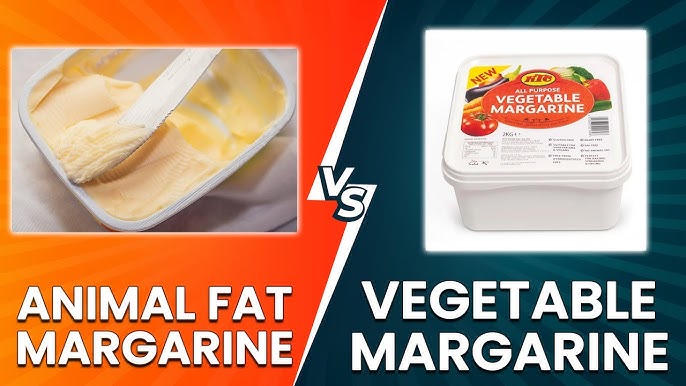Table of Contents:
Introduction to Margarine Types
Ingredients: What’s in Animal Fat and Vegetable Margarine?
Health Comparisons: Saturated Fats, Cholesterol, and Trans Fats
Environmental Impact: Animal-Based vs Plant-Based Production
Uses in Cooking and Baking
Choosing the Right Margarine for Your Needs
FAQ: Common Questions About Margarine
When you’re shopping for margarine, the choices can be overwhelming: animal fat margarine or vegetable margarine? These two options may look similar, but they’re worlds apart in terms of ingredients, health implications, and even environmental impact. Let’s dive in and see what makes them unique.

Animal Fat Margarine:
This type is made from fats derived from animals, often beef or pork fat. It may also contain small amounts of butter, giving it a creamy texture and rich flavor.
Vegetable Margarine:
Made primarily from plant-based oils like soybean, sunflower, or palm oil. It’s often favored for being cholesterol-free and vegan-friendly (if it’s dairy-free).
| Feature | Animal Fat Margarine | Vegetable Margarine |
|---|---|---|
| Base Ingredient | Animal fats (e.g., lard, tallow) | Plant oils (e.g., soybean oil) |
| Cholesterol | Contains cholesterol | Cholesterol-free |
| Vegan-Friendly? | No | Yes (if labeled as vegan) |
| Texture | Rich and creamy | Light and spreadable |
Saturated and Unsaturated Fats:
Animal fat margarine typically has more saturated fats, which can raise LDL cholesterol (the “bad” kind).
Vegetable margarine is higher in unsaturated fats, like Omega-3 and Omega-6, which are better for heart health.
Trans Fats and Hydrogenation:
Some older margarine brands used partially hydrogenated oils, leading to trans fats. Nowadays, most vegetable margarine is trans-fat-free, but always check the label!
| Health Aspect | Animal Fat Margarine | Vegetable Margarine |
|---|---|---|
| Saturated Fat | Higher | Lower |
| Unsaturated Fat | Lower | Higher |
| Cholesterol Content | Contains cholesterol | None |
| Trans Fat Risk | Minimal (modern versions) | Minimal (modern versions) |
Animal Fat Margarine:
Using animal fat involves the meat industry, which has a higher carbon footprint and water usage. However, it might utilize by-products, making it less wasteful.
Vegetable Margarine:
While plant-based oils are more sustainable, palm oil—a common ingredient—raises concerns about deforestation and habitat loss. Opt for brands using sustainably sourced ingredients.
Animal Fat Margarine:
Its rich flavor makes it ideal for pastries, frying, and traditional recipes. It holds up well at high temperatures.
Vegetable Margarine:
Great for spreading on toast, vegan baking, and making creamy sauces. It’s also a popular choice for heart-healthy diets.
For Health-Conscious Consumers: Vegetable margarine is a better choice due to its lower saturated fat and zero cholesterol.
For Traditional Cooking: Animal fat margarine delivers a robust flavor that’s hard to beat.
For Sustainability: Check for vegetable margarine brands that use eco-friendly and sustainably sourced oils.
Q: Is animal fat margarine healthier than vegetable margarine?
A: Not necessarily. While it’s flavorful, it has more saturated fat and cholesterol.
Q: Can vegetarians eat animal fat margarine?
A: No, because it’s made from animal-derived ingredients.
Q: Is vegetable margarine vegan?
A: Most are, but check the label to ensure it’s dairy-free.
Q: Which is better for baking, animal fat or vegetable margarine?
A: Both work, but animal fat margarine gives a richer taste, while vegetable margarine is better for vegan recipes.
Whether you choose animal fat margarine or vegetable margarine depends on your dietary preferences, health goals, and environmental concerns. Both have their pros and cons, so it’s all about finding what works best for you.
Want heart-healthy options? Go plant-based. Craving that classic buttery flavor? Animal fat margarine might be your pick. Either way, always read the labels and make informed choices!
animal tags: animal-fat-margarine vegetable-margarine
We created this article in conjunction with AI technology, then made sure it was fact-checked and edited by a Animals Top editor.